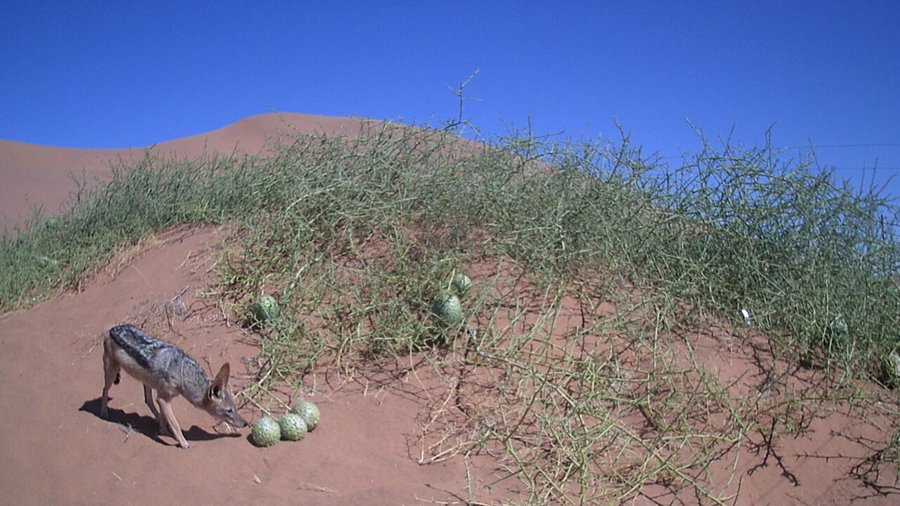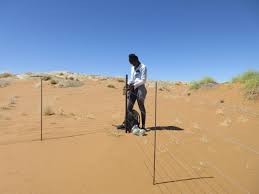Jackals help !naras flourish
Research in Namib-Naukluft
Namibian scientist Saima Shikesho made the discovery while studying the role jackals played in distributing the seeds of the plant.
Black-backed jackals in Namibia urinate on sweet melons that grow in the Namib Desert to prevent other jackals from stealing their favourite fruit, new research has revealed.
The finding sheds new light on how the plants have populated the harsh environment, providing other species with a crucial source of food and moisture.
Namibian scientist Saima Shikesho made the discovery while studying the role the jackals played in distributing the seeds of the !nara plant – a desert shrub only found in Namibia that produces large, round, sweet melons encased in tough, spiny skin.
Shikesho was surprised when she reviewed images obtained via camera traps, that the animals occasionally squatted or cocked their legs to urinate on the fruit.
“It could work as territorial marking, but another question that came in my mind was: ‘Are they trying to hide the scent of ripe melons, or like, it’s about to ripen but it’s not really there and therefore, if I mark it, maybe other animals will stay away from this one resource’?”
Seed dispersers
Until now, it was unclear who or what was responsible for distributing the seeds of the !nara plant – an important source of food, moisture and even shelter for animals and humans in the Namib's harsh environment.
While both wild and domestic herbivores – including oryx, cattle and donkeys – also eat the fruit, they have large molar teeth that crush the seeds. Jackals have less developed molars, which means the seeds pass through them intact.
Shikesho found 200 undamaged seeds in just eight jackal droppings, and none in the droppings of donkeys, cattle and oryx.
The seeds collected from jackal droppings germinated more successfully than seeds taken from ripe fruit.
Shikesho, who is now a PhD candidate at Dartmouth College in the United States of America, carried out the research while doing her master’s at the University of Cape Town. She set up the camera traps to monitor eight !nara plants in the Namib-Naukluft National Park.
The shrubs were fenced off to exclude herbivores, but small openings were left for jackals and similar-sized mammals to get through.
Other carnivores such as Cape foxes and brown hyenas also visited the plants and took melons, but Shikesho’s study, published in the Journal of Zoology, found that jackals visited the plants more than 96% of the time.
The !nara melons don’t change colour when they ripen, making it extremely difficult to tell ripe fruit apart from unripe ones. When Shikesho had to collect ripe melons to extract seeds for her germination experiment, she sought help from experts within the local Topnaar community.
“They have to carry this stick and poke the melon,” she said. “And then they’ll say, ‘that one is ripe, that one is not ready’.”
'Mind-blowing'
That jackals can make such distinctions with one quick sniff was "kind of mind-blowing for me", Shikesho said. "That’s like a high-level decision-making process."
Archaeological evidence shows that humans have used the !nara fruit for around 8 000 years. It remains a vital source of livelihood and sustenance for the Topnaar people, who also herd cattle, sheep and goats along the Kuiseb River.
The community uses the plants' roots for medicine, turns the cooked melon pulp into dried fruit rolls, and expresses oil from the seeds.
Shikesho said she enjoyed sharing her findings with the community, which was unaware of the role the jackals played in spreading !nara seeds.
“We as scientists understand why we’re doing research, but in most cases, we don’t really explain it to people who don’t really think about science.”
The finding sheds new light on how the plants have populated the harsh environment, providing other species with a crucial source of food and moisture.
Namibian scientist Saima Shikesho made the discovery while studying the role the jackals played in distributing the seeds of the !nara plant – a desert shrub only found in Namibia that produces large, round, sweet melons encased in tough, spiny skin.
Shikesho was surprised when she reviewed images obtained via camera traps, that the animals occasionally squatted or cocked their legs to urinate on the fruit.
“It could work as territorial marking, but another question that came in my mind was: ‘Are they trying to hide the scent of ripe melons, or like, it’s about to ripen but it’s not really there and therefore, if I mark it, maybe other animals will stay away from this one resource’?”
Seed dispersers
Until now, it was unclear who or what was responsible for distributing the seeds of the !nara plant – an important source of food, moisture and even shelter for animals and humans in the Namib's harsh environment.
While both wild and domestic herbivores – including oryx, cattle and donkeys – also eat the fruit, they have large molar teeth that crush the seeds. Jackals have less developed molars, which means the seeds pass through them intact.
Shikesho found 200 undamaged seeds in just eight jackal droppings, and none in the droppings of donkeys, cattle and oryx.
The seeds collected from jackal droppings germinated more successfully than seeds taken from ripe fruit.
Shikesho, who is now a PhD candidate at Dartmouth College in the United States of America, carried out the research while doing her master’s at the University of Cape Town. She set up the camera traps to monitor eight !nara plants in the Namib-Naukluft National Park.
The shrubs were fenced off to exclude herbivores, but small openings were left for jackals and similar-sized mammals to get through.
Other carnivores such as Cape foxes and brown hyenas also visited the plants and took melons, but Shikesho’s study, published in the Journal of Zoology, found that jackals visited the plants more than 96% of the time.
The !nara melons don’t change colour when they ripen, making it extremely difficult to tell ripe fruit apart from unripe ones. When Shikesho had to collect ripe melons to extract seeds for her germination experiment, she sought help from experts within the local Topnaar community.
“They have to carry this stick and poke the melon,” she said. “And then they’ll say, ‘that one is ripe, that one is not ready’.”
'Mind-blowing'
That jackals can make such distinctions with one quick sniff was "kind of mind-blowing for me", Shikesho said. "That’s like a high-level decision-making process."
Archaeological evidence shows that humans have used the !nara fruit for around 8 000 years. It remains a vital source of livelihood and sustenance for the Topnaar people, who also herd cattle, sheep and goats along the Kuiseb River.
The community uses the plants' roots for medicine, turns the cooked melon pulp into dried fruit rolls, and expresses oil from the seeds.
Shikesho said she enjoyed sharing her findings with the community, which was unaware of the role the jackals played in spreading !nara seeds.
“We as scientists understand why we’re doing research, but in most cases, we don’t really explain it to people who don’t really think about science.”






Kommentar
Allgemeine Zeitung
Zu diesem Artikel wurden keine Kommentare hinterlassen